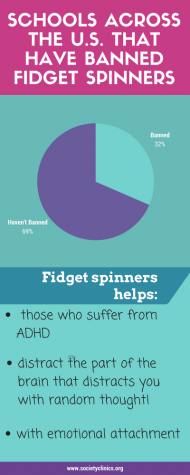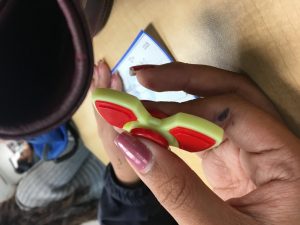Fidget spinners: the distraction that is not a distraction
Sophomore Sofia Nunez enjoys using a fidget spinner and says that it helps her concentrate in class.
May 24, 2017
Fidget spinners,“small, ball-bearing devices that the user can rotate between his or her fingers,” have become the trend of 2017. In every single class, there are a handful of students using a fidget spinner to help them study in class.
Fidget spinners were intended to help those who suffer from ADHD or anxiety, serving as a distraction that can help relieve stress. “For some people [with ADHD], there’s a need for constant stimulation,” said Elaine Taylor-Klau, the co-founder of ImpactADHD, “What a fidget allows some people — not all people — with ADHD to do is to focus their attention on what they want to focus on, because there’s sort of a background motion that’s occupying that need.” A study in 2015 in the Journal of Abnormal Child Psychology showed children between the ages of 8 and 12 with ADHD needed something to “fidget with” when doing tasks with working memory.
But now fidget spinners have ended up in the hands of those who simply just want something to help them concentrate in class. Many people tap their pencils, click their pens or shake their leg. The fidget spinner acts as the substitute and has proven to be useful based on research and experience.

caption
Having something to fidget with is extremely useful. According to Forbes, fidgeting helps “occupy parts of your brain that otherwise would distract the rest of your brain with random thoughts.” They used the analogy of distracting a young child with a toy so that the young child doesn’t constantly bother anybody else. Fidget spinners help with that constant bother.
Forbes also states that fidget spinners can help “emotional attachment to an object.” Many people are attached to physical objects, especially their phones. Having something physical to rely on helps give reassurance and makes one at ease. Just by having a fidget spinner can help make someone’s change completely.
Despite positive uses, many schools are not fond of fidget spinners and have banned them. Washington Elementary in Evanston, Illinois has banned them because they are a “disruption.” Some teachers at Clark ask students to get a doctor’s note in order to use fidget spinners during class, while others simply ban them all together. One teacher told her class that she gets anxious while looking at them.
Sixty-three of 200 of the top high schools, both private and public, in the U.S. have banned fidget spinners according to SpinnerList. The 137 schools that haven’t banned them haven’t banned them because they know that the students actually benefit from them and know that they aren’t just a distraction.
This has outraged students. Not being able to use phones during class is a rule that is understood by everyone (although not always followed). Not talking during class is another. But simply spinning a toy for the purpose of helping someone not get distracted shouldn’t be considered a distraction. They are used to help those who need a distraction in order to concentrate in their studies and assignments. Fidget spinners have not posed any threat and can’t harm or offend anyone.




